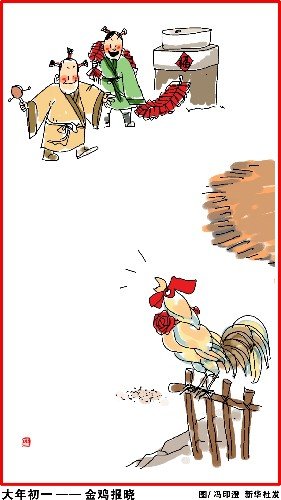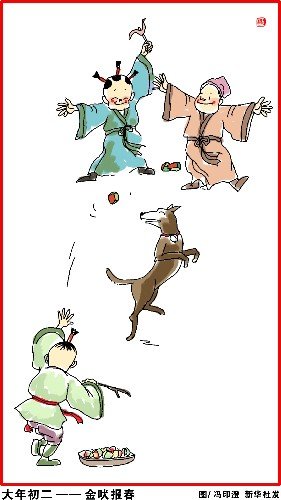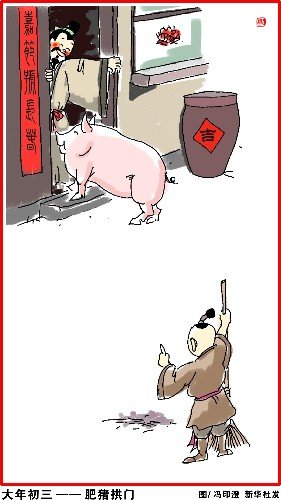初一到十五 春节习俗知多少
中国日报网 2018-02-16 10:00

农历正月初一,新的一年正式开始。英语点津编辑部给大家拜年了!祝大家新年吉祥如意,平安健康!
虽说如今我们的生活天天都像过年,但是在传统文化中,春节的每一天都是有讲究的。比如,初一早上吃饺子、放鞭炮,初二女儿回娘家拜年,初四迎灶神,等等。
咱们一起回顾一下吧。

大年初一:金鸡报晓
The first day of Chinese New Year, also known as the "day of chicken", officially begins at midnight.
午夜零点时分,人们正式跨入新年第一天,也叫“金鸡报晓”。
It is traditional to light firecrackers and make as much of a din as possible to chase off the evil monster nian.
传统习俗是,人们会燃放鞭炮,尽可能制造大的喧闹声赶走邪恶的妖怪“年”。
Most importantly the oldest and most senior members are visited with the visits strengthening family kinship.
最重要的习俗是,人们会拜访家中最年长的长辈,以加强家人之间的亲情。
Senior members of the family hand out red envelopes containing cash (Chinese: ya sui qian), a form of blessing and to suppress aging and the challenges of the coming year, to junior members of the family, mostly children and teenagers.
而家中的长辈会给晚辈(主要是儿童和青少年)红包(中国人称之压岁钱),代表着对晚辈的祝福,也是祈祷自己在来年身体康健、万事如意。

大年初二:金吠报春
On the second day, married daughters usually go back to their own family to visit parents, relatives and close friends. Traditionally, married daughters didn't have the opportunity to visit their birth families frequently.
初二,出嫁的女儿会回娘家给父母、亲人和密友拜年。旧时,女儿出嫁后拜访娘家父母的机会并不多。
Some believe the second day is also the birthday of all dogs and remember them with special treats.
还有一些人认为初二是所有犬类的生日,因此要给它们好吃的以示庆祝。

大年初三:肥猪拱门
On the third day, an old saying goes: "A fat pig at the door", meaning the arrival of good luck and happiness.
初三,有一句俗语“肥猪拱门”,预示着好运和幸福的到来。
Traditionally, the third day is known as "Chigou's Day". Chigou literally means "red dog", an epithet of "the God of Blazing Wrath", and it is considered an unlucky day to have guests or go visiting.
初三还有一个传统俗称是“赤狗日”。赤狗的意思是红色的狗,是熛怒之神的绰号,因此人们认为这一天不宜接客或出访。
Folklore says the 3rd day is also "rat marriage day" (Chinese: lao shu qu qin), so people often go to bed earlier to give rats time for their wedding.
民间还传说初三是老鼠娶亲日,所以人们晚上会早早上床歇息,腾出时间给老鼠们成亲。

















 英语点津微信
英语点津微信 双语小程序
双语小程序